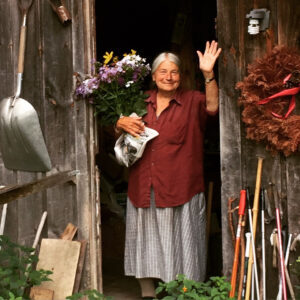by Nancy Olson
Elka Leigh Scott Schumann, (1935 – 2021) is perhaps best known in Vermont as the co-founder with her husband Peter Schumann of Bread and Puppet Theater, located in the town of Glover, in Vermont’s Northeast Kingdom. But she also has some interesting ties to the town of Putney.

First, some background on Elka’s life. Her grandfather, Scott Nearing (1883-1983), is well known as the author, with his second wife Helen, of “Living the Good Life: How to Live Sanely and Simply in a Troubled World,” the book that became the bible of the “Back to the Land” movement of the 1970s. Scott and Helen had built a homestead in Winhall, Vermont, from 1932 to 1952, before moving to Maine. Despite being a child of privilege, Scott Nearing held strongly socialist views all his life.
Elka’s father, John Scott (1912-1976), was the son of Scott Nearing and his first wife, Nellie Margeurite Seeds Nearing. Coming of age in the depths of the Great Depression, John dropped out of college and moved to the USSR, seeking to put his socialist beliefs to work as a steelworker in the city of Magnitogorsk. There he met and married Maria Dikareva Ivanovna, who gave birth to Elka and her younger sister Elena. With World War II underway, the family left the Soviet Union on June 22, 1941, only two hours before the start of the Nazi invasion.
The family stayed for a while with John’s brother in Pennsylvania before moving to Greenwich Village. Elka and her sister attended a progressive elementary school. After WW II ended, John took a job with Time, Inc., that took the family to Berlin for three years. Returning to the U. S., the family moved to Ridgefield, Connecticut, where John had bought land. Elka and her sister attended Ridgefield High School. According to a memorial written by her son Max Schumann, Elka continued her involvement with the arts—visual, music, and dance. For her final year of high school, 1952-53, Elka attended The Putney School. The summer after graduation, she traveled with her father in western Europe, before attending Bryn Mawr College.
Elka spent her junior year abroad in Germany. In the city of Munich she was first introduced to Peter Schumann, who was in the hospital after experiencing a nearly fatal head injury as the result of a bicycle accident. Peter’s experimental dance group was recruiting. Max quotes what his mother wrote of that meeting: “We didn’t have any big conversation: he was still recovering. I just knew I had to see him again and again. It was mysterious and very strong.” So strong, in fact, that Elka took a year off from college to join Peter’s troupe. She came back to Bryn Mawr, graduating in 1958 with a degree in Art History, then returned to Europe and Peter. They married in 1959.
In the early 1960s, Elka and Peter and their two children moved to New York City where in 1962, Elka gave birth to a third child. That summer the family moved briefly to Putney as Elka began studying for a Master’s degree in Russian Literature at the Institute of Critical Languages at Windham College in Putney. This program was organized in 1960 by Dr. Mariana Artemievna Poltoratzky (1906-1968) and Dr. Walter Hendricks (1892-1979), president of Windham College, and remained on the Windham College campus until 1968, when the program moved to Norwich.
For the 1962-63 academic year, Elka taught Russian at The Putney School, while her former teacher was on sabbatical. In the summer of 1964, while Elka completed her studies in Russian language and literature, Peter toured New England towns giving impromptu puppet shows, and the grandparents in Ridgefield took care of the three children.
The Schumann family returned to New York City, where Bread and Puppet began to be noticed in both Europe and the U. S. After a decade, due to increasing crime in their neighborhood, the Schumanns and Bread and Puppet accepted an invitation in 1970 to be theater in residence at Goddard College. Five years later, Elka’s parents agreed to allow the Schumanns and their Bread and Puppet group to move to the Dopp farm in Glover, a property her parents had bought in 1970 as a possible retirement home.
And the rest is Vermont history. If Peter Schumann is the driving force of the theater, Elka Schumann was the heart of the endeavor. In addition to caring for their five children, she grew vegetable and flower gardens, raised animals for home use, managed a 1,000-tap sugaring operation, spun and dyed wool, knitted, sewed, developed and ran a print shop, wrote and archived the publicity for the theater, ran the museum shop, gave puppet shows for children, organized the volunteers, for whom she cooked meals, turned the barn into a puppet museum, sang, played her lute and recorder, and wrote letters.
Elka Schumann is survived by her husband, Peter Schumann of Glover, Vermont; her children Tamar Schumann of Glover; Salih Schumann of Glover; Solveig Schumann of Brooklyn, New York; Max Schumann of New York, New York; and Maria Schumann of Greensboro, Vermont; her grandchildren; her sister Elena; many nieces and nephews; and dear friends.
Putney, Vermont, had a small part to play in the story of her life.
Much of the information in this article comes from “Elka Schumann In Memoriam” by Max Schumann and the obituary for Elka Schumann published in The Chronicle, August 25, 2021.